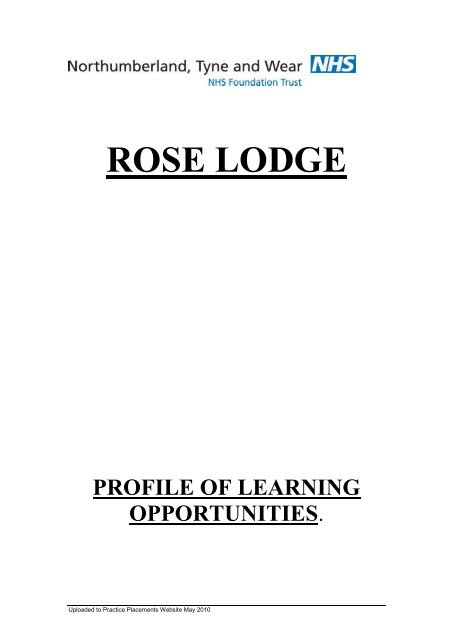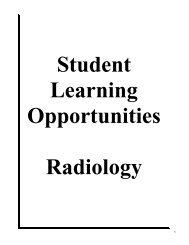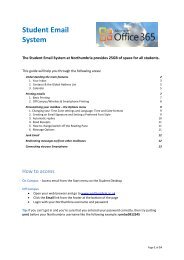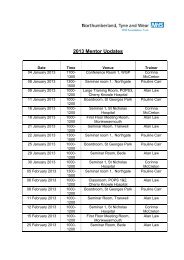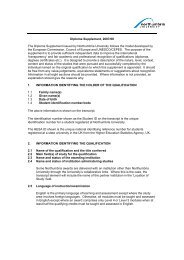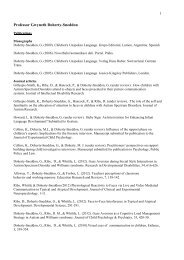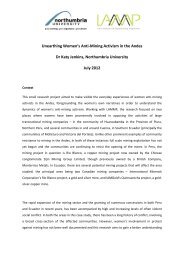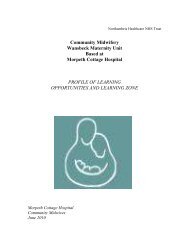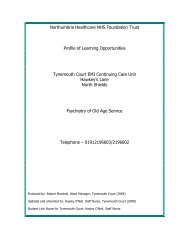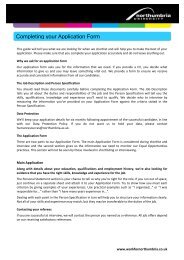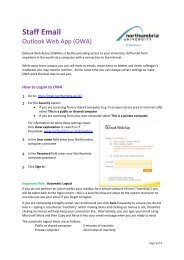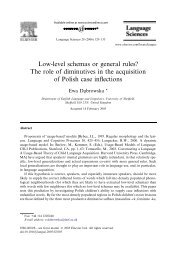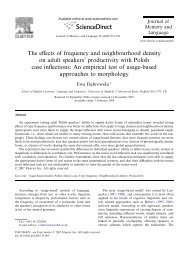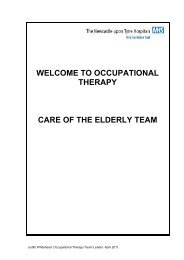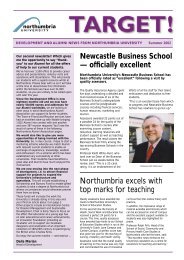LD Rose Lodge
LD Rose Lodge
LD Rose Lodge
Create successful ePaper yourself
Turn your PDF publications into a flip-book with our unique Google optimized e-Paper software.
ROSE LODGE<br />
PROFILE OF LEARNING<br />
OPPORTUNITIES.<br />
Uploaded to Practice Placements Website May 2010
GUIDANCE NOTES<br />
1. The learning profile is a comprehensive document detailing all the learning<br />
opportunities available in a specific clinical/ residential area.<br />
2. It is intended that students (supported by their mentor) can use information in<br />
order to select appropriate opportunities to help meet the specified<br />
competencies outlined in the practice portfolio for that placement and any<br />
agreed additional competencies.<br />
3. Students should not expect to access all of the available learning opportunities<br />
during one placement.<br />
4. It is the responsibility of the manager of the clinical area to maintain this<br />
document.<br />
5. It is recommended that the minimum review period for this document is one<br />
year.<br />
Uploaded to Practice Placements Website May 2010
CONTENTS<br />
1. Area of learning<br />
2. Learning opportunities<br />
3. Key Elements<br />
4. Learning Zone<br />
5. Reading list<br />
Uploaded to Practice Placements Website May 2010
<strong>Rose</strong> <strong>Lodge</strong> area profile<br />
Location<br />
Clinical area<br />
Working hours<br />
Uploaded to Practice Placements Website May 2010<br />
<strong>Rose</strong> <strong>Lodge</strong> is a stand alone unit situated<br />
in Hebburn, Tyne and Wear.<br />
Full postal address is:<br />
<strong>Rose</strong> <strong>Lodge</strong><br />
Hospital Drive<br />
Hebburn<br />
Tyne and Wear<br />
NE31 2TH<br />
Tel: (0191) 4963800<br />
Within 10 minutes walking distance of<br />
Hebburn metro station and several major<br />
bus routes. Bus number 27A will take<br />
you to Hebburn shopping centre.<br />
<strong>Rose</strong> <strong>Lodge</strong> is a new specialist centre for<br />
people with learning disabilities who<br />
require a period of assessment and<br />
treatment within an inpatient<br />
environment. This may be due to mental<br />
health problems, challenging behaviour<br />
or for physical examination such as<br />
stabilisation of epilepsy or a breakdown<br />
in care/ environment as a consequence to<br />
one of these factors.<br />
<strong>Rose</strong> <strong>Lodge</strong> is located in Hebburn, Tyne<br />
and Wear and provides services to people<br />
of South Tyneside and Gateshead.<br />
The unit has twelve in patient beds with<br />
provision for both male and female<br />
patients.<br />
<strong>Rose</strong> <strong>Lodge</strong> operates within a 24 hour<br />
system of care. Shift patterns meet the<br />
requirements of the service however<br />
flexibility can be negotiated by students
Philosophy of care<br />
Organisation of nursing care<br />
Uploaded to Practice Placements Website May 2010<br />
during their initial contact with their<br />
mentor. Fundamentally we operate under<br />
the long day system of care.<br />
Long day 7:45- 20:00<br />
Early shift: 7:45-16:45<br />
Late shift: 11:00-20:00<br />
Night duty:19:45- 8:00<br />
<strong>Rose</strong> <strong>Lodge</strong> is committed to a process of<br />
Multidisciplinary care. It strives to offer a<br />
high standard of care and treatment using<br />
A needs- led approach. Central to our<br />
philosophy is the concept of patient<br />
centred care. This ensures that the patient<br />
plays an active role in their care and<br />
treatment. Patients are cared for in an<br />
environment that demonstrates the<br />
upmost respect for their privacy, dignity<br />
and independence. The team endeavour<br />
to provide a service that delivers evidence<br />
based practice through regional and<br />
national networks and staff development.<br />
The unit’s staffing level; training and<br />
shift pattern are designed to promote<br />
positive, therapeutic engagement<br />
however they also allow for appropriate,<br />
structured responses.<br />
The unit operates a named nurse system<br />
with each patient being allocated a<br />
registered nurse who co-ordinates the<br />
development of care plans, treatment<br />
strategies and compiles nursing reports in<br />
conjunction with the patient and members<br />
of the multi disciplinary team.<br />
The key workers work with supervision<br />
of the named nurse in implementing care,<br />
supporting individuals with personal care,<br />
promoting independence and observing/<br />
reporting progress/ development or<br />
signs/symptoms of mental health<br />
problems.
Dress code<br />
Uploaded to Practice Placements Website May 2010<br />
During your placement at <strong>Rose</strong> <strong>Lodge</strong> it<br />
is expected that your dress and<br />
appearance should reflect professionalism<br />
at all times. For Male staff smart trousers<br />
should be worn with a shirt or a polo<br />
neck t-shirt with a collar. Neck ties are<br />
not advised.<br />
For female staff Smart trousers or skirts<br />
below the knee with appropriate top.<br />
For all no denim jeans, tracksuits, t-shirts<br />
with slogans, miniskirts, or low cut tops<br />
should be worn.<br />
Foot wear comfortable shoes or boots no<br />
trainers or stiletto heals may be worn.<br />
Jewellery should be kept to minimum<br />
when on duty and body piercings other<br />
than ear piercings should be covered up<br />
or removed.
Key Element: Interpersonal skills<br />
Learning<br />
opportunities<br />
To communicate<br />
relevant information<br />
effectively and<br />
appropriately to:<br />
Members of the<br />
MDT and other<br />
professionals.<br />
Patients and<br />
service users.<br />
Families and<br />
carers.<br />
Other relevant<br />
parties.<br />
Maintain accurate<br />
written documentation<br />
in line with the NMC<br />
guidance.<br />
Developing therapeutic<br />
relationships.<br />
Alternative<br />
communication<br />
Reflective practice/<br />
supervision<br />
Uploaded to Practice Placements Website May 2010<br />
Learning profile<br />
Resource/ Type of evidence Relevant personnel<br />
Ward hand over’s<br />
MDT meetings and<br />
ward rounds.<br />
CPA meetings<br />
Mental health<br />
tribunals<br />
Formulations<br />
Communication<br />
books<br />
Diary<br />
Hand over file<br />
Telephone calls<br />
E-mail<br />
Clinical notes<br />
Nursing reports<br />
Clinical notes<br />
Nursing reports<br />
Trust policy<br />
NMC standards<br />
Care plans<br />
Communication passports<br />
Observation recording<br />
Assessment tools<br />
Makaton, BSL<br />
Care plans<br />
Clinical supervision policy<br />
Fortnightly supervisions with<br />
mentor<br />
Nursing staff<br />
All nursing staff<br />
Members of the<br />
MDT<br />
Professionals allied<br />
to medicine<br />
Patients<br />
Carers and families<br />
Service providers.<br />
All members of the MDT.<br />
Patients<br />
All nursing staff<br />
Speech and language<br />
therapist<br />
Psychology<br />
Mentor/ co- mentor
Key Element: Clinical skills<br />
Learning opportunities Resources/ Types of<br />
evidence<br />
Develop knowledge and<br />
experience of a range of<br />
pharmacological<br />
interventions.<br />
Opportunity to<br />
dispense/<br />
administer<br />
medication orally<br />
Topical medication<br />
Administer<br />
subcutaneous<br />
injections<br />
Administer intra-<br />
muscular injections<br />
Enteral<br />
medication.<br />
Observation of<br />
phlebotomy procedure<br />
Opportunity to<br />
demonstrate and<br />
understand the<br />
significance of a range of<br />
physical observations.<br />
Temperature<br />
Pulse<br />
BP<br />
Urinalysis<br />
Testing BM<br />
Pulse oximetry<br />
Uploaded to Practice Placements Website May 2010<br />
Pharmacology competency<br />
Medicine management<br />
policy<br />
Observation and practical<br />
experience.<br />
Simulation<br />
Observation<br />
Full range of diagnostic<br />
equipment is available<br />
Individual patient care<br />
plans<br />
Relevant personnel<br />
Registered nurse<br />
Pharmacist<br />
GP<br />
Consultant<br />
Ward based phlebotomist<br />
Practice nurse<br />
Pathology<br />
Registered nurses<br />
Practice nurse<br />
GP<br />
Consultant<br />
Oral hygiene Dentist<br />
Dental hygienist<br />
Staff<br />
Patients
Monitoring weight (body<br />
mass index)<br />
Insight into wound care,<br />
skin and tissue viability<br />
To gain knowledge and<br />
understanding of epilepsy<br />
and the assessment and<br />
treatment involved.<br />
To attend/ observe<br />
physical health<br />
appointments/<br />
investigations including:<br />
GP appointments<br />
Dental<br />
appointments<br />
Physiotherapy<br />
ECG<br />
EEG<br />
ECT<br />
MRI scan<br />
To gain an understanding<br />
of the use of medication in<br />
the stabilisation and<br />
treatment of mental health/<br />
behaviour symptoms and<br />
their potential impact on<br />
their physical health.<br />
Uploaded to Practice Placements Website May 2010<br />
Essential equipment/<br />
dressings etc.<br />
Braden scale<br />
Aseptic technique<br />
Assessment and recording<br />
tools.<br />
Use of medication<br />
Health action plans<br />
Dietician<br />
staff<br />
Registered nurse<br />
Practice nurse<br />
GP<br />
Patients<br />
Registered nurses<br />
Epilepsy specialist nurse<br />
Consultant<br />
GP<br />
Pharmacist<br />
Registered nurses<br />
Staff<br />
Patient<br />
Practice nurse<br />
GP<br />
Dietician<br />
Podiatrist<br />
Out patients staff<br />
Consultant<br />
Consultant<br />
Registered nurse<br />
Pharmacist
Health promotion<br />
Smoking cessation<br />
Breast and<br />
testicular<br />
examination<br />
Healthy eating a<br />
exercise<br />
Health and safety issues<br />
Participation in admission/<br />
discharge process<br />
implementing a planned<br />
programme of care/<br />
treatment for the<br />
individual through the<br />
Care programme approach<br />
Health action plans<br />
Care plans<br />
Teaching plans<br />
Uploaded to Practice Placements Website May 2010<br />
Trust policies and<br />
procedures<br />
Audits<br />
Moving and handling<br />
assessments<br />
Unit admission and<br />
discharge procedures.<br />
CPA process and relevant<br />
documentation.<br />
Unit staff<br />
Dietician<br />
Practice nurse<br />
GP<br />
SALT<br />
Registered nurses<br />
Audit rep with area<br />
Audit link nurse<br />
Registered nurses<br />
Members of the MDT
Key element: Organisation of care<br />
Learning opportunities Resources/ Types of<br />
Evidence<br />
Gain insight into the roles<br />
of the named nurse and<br />
work in partnership with<br />
them for an allocated<br />
patient.<br />
To complete the daily<br />
allocation of staff team.<br />
To prepare and participate<br />
in patient weekly MDT<br />
meetings, CPA meetings,<br />
formulation meetings.<br />
Carry out the nursing<br />
process for allocated<br />
patient i.e. assess, plan,<br />
implement and evaluate<br />
Accessing the local<br />
community. Socialising,<br />
social training and<br />
educational.<br />
Uploaded to Practice Placements Website May 2010<br />
Unified health records<br />
Allocation sheet<br />
Preparation of reports<br />
Case review notes<br />
Care programme approach<br />
CPA documentation<br />
Minutes of meetings<br />
Unified health records<br />
Unit working procedure<br />
Unified health records<br />
Assessment tools<br />
Unit working procedure<br />
Day services<br />
College/ training courses<br />
Mental health Act section<br />
17<br />
Escorting<br />
Behavioural interventions Formulation<br />
Behavioural support plans<br />
Risk management plans<br />
Working with patients<br />
detained under the Mental<br />
Health Act. Gain<br />
knowledge and<br />
understanding of the<br />
Mental health Act<br />
Mental health act paper<br />
work<br />
Managers<br />
hearings/Tribunals<br />
Relevant personnel<br />
Mentor<br />
All staff<br />
Members of the MDT<br />
Patient<br />
Carers/ families<br />
All staff<br />
Registered nurses<br />
Members of the multi<br />
disciplinary team.<br />
Patients<br />
Carers/ relatives<br />
Registered nurses<br />
Service providers<br />
Unit staff<br />
Activities co-ordinator<br />
AOT<br />
HATT<br />
Unit staff<br />
Psychology<br />
Behavioural specialist<br />
nurse<br />
Registered nurses<br />
Consultants<br />
Patients.<br />
Social workers
mental health act, reading<br />
the patient their rights.<br />
Capacity to consent to<br />
admission and treatment.<br />
Knowledge of MAPPA<br />
process.<br />
Key element: Management skills<br />
MAPPA meetings<br />
Learning opportunities Resources/ Type of<br />
evidence<br />
To take the lead in the day<br />
to day running of the unit.<br />
Allocating staff, carry out<br />
hand over etc.<br />
Patients finances and petty<br />
cash<br />
Report writing<br />
Accident/ incident<br />
reporting<br />
Sickness and absence<br />
monitoring<br />
Arrange/ facilitate ward<br />
rounds/ CPA meetings and<br />
follow up on actions/<br />
recommendations<br />
Reflective practice/<br />
supervision/ KSF<br />
Unit procedure<br />
Uploaded to Practice Placements Website May 2010<br />
Trust policy<br />
Finance documentation<br />
Unified health record<br />
Trust policies and<br />
procedures<br />
Record management<br />
CPA process<br />
Accident/ incident book<br />
(IR1)<br />
Safeguarding process<br />
Trust policy and procedure<br />
Trust policies and<br />
procedures<br />
Reporting system<br />
CPA process and<br />
documentation<br />
Ward round<br />
documentation<br />
Unified health records.<br />
Trust policies and<br />
procedures.<br />
Be involved in staffs<br />
supervisions/ KSF’s<br />
Relevant personnel<br />
Unit staff<br />
Registered nurses<br />
Registered nurses<br />
All staff<br />
Service manager<br />
Safeguarding adults unit<br />
Registered nurses<br />
Manager<br />
Human resources<br />
Registered nurses<br />
Consultants<br />
Members of the MDT<br />
Patients<br />
All staff
Uploaded to Practice Placements Website May 2010
SOCIAL<br />
WORKER<br />
CONSULTANTS<br />
ASSERTIVE OUT<br />
REACH TEAM<br />
INTENSIVE<br />
SUPPORT<br />
TEAM<br />
NURSING STAFF<br />
GENERAL<br />
PRACTITIONERS<br />
SERVICE<br />
MANAGERS<br />
ROSE LODGE - LEARNING ZONE<br />
Uploaded to Practice Placements Website May 2010<br />
HATT<br />
LEAD<br />
NURSES<br />
COMMUNITY<br />
NUSING<br />
ROSE LODGE<br />
FAMILY<br />
PROBATION<br />
SERVICES<br />
INDEPENDENT<br />
SERVICE<br />
PROVIDERS<br />
SPEECH AND<br />
LANGUAGE<br />
THERAPIST<br />
POLICE<br />
PHYSIO<br />
THERAPISTS<br />
PSYCHOLOGHY<br />
OCUPATIONAL<br />
THERAPISTS<br />
DIETICIAN<br />
ADVOCACY<br />
PHARMACY<br />
EPILEPSY<br />
SPECIALIST<br />
NURSE<br />
PALS
Uploaded to Practice Placements Website May 2010<br />
Student reading list<br />
Gates, B. (2003) Learning Disabilities- Toward inclusion, 4 th Edition. Churchill-<br />
Livingston<br />
Barker, P. & Cutcliffe, J. (1999) Clinical risk: A need for engagement not<br />
observation. Mental Health Practice. Vol 2, 8<br />
Department of Health (2001) Valuing people: a new strategy for learning disability<br />
for the 21 st century. Cm5086. The stationary Office, London.<br />
Mental Health Act (1983) HMSO, London.<br />
Department of Health (2001) Seeking consent: working with people with learning<br />
disabilities. The stationary office, London.<br />
Department of Health (2004) The NHS improvement plan: Putting people at the heart<br />
of the public services. Cm6268. The stationary office, London.<br />
NMC (2002) Guidelines for the administration of medicines. Nursing and Midwifery<br />
Council.<br />
NMC (2002) Guidelines for record keeping. Nursing and Midwifery Council.<br />
www.bnf.org<br />
www.learningdisabilities.org.uk
Uploaded to Practice Placements Website May 2010


